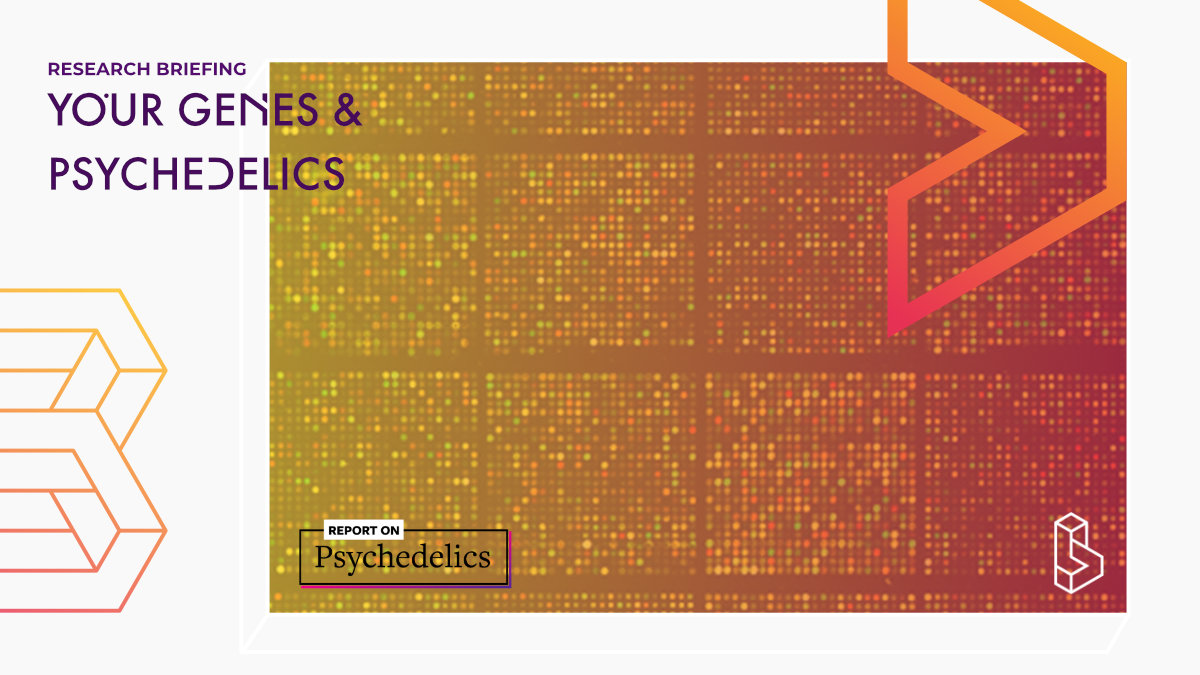This research briefing is co-published with the excellent Report on Psychedelics.
May 27, 2021
In The Research Briefing:
- The intensity of an LSD experience as predicted by your genes
- A brain on psilocybin becomes less segregated
- Bringing people from different worlds together through ayahuasca
LSD
Genetic markers predict someone’s response to LSD
We all know that one person who is able to drink four beers and not feel a thing. Or that friend who becomes giggly after barely touching their first drink. We know a lot about which genes influence how our body processes alcohol (pharmacogenetics). The current study, by the team at the University Hospital Basel, is taking the first step to uncover genetic influences on our reaction to LSD.
In the study, which pooled data from 81 participants, the team looked specifically at genetic variants of the CYP gene. This gene is responsible for making enzymes that deal with things our body doesn’t normally encounter (it metabolises xenobiotics). And without a functional version of the CYP2D6 gene (and thus no enzymes), your trip will be longer and more intense.
This is what we know about LSD pharmacogenetics
- Those without CYP2D6 showed higher concentrations of LSD in their blood plasma (75% more total exposure)
- And had more intense and longer-lasting trips as measured on a visual distortion and a mysticism scale
- This is the very first study to show this in humans, at the same time only 7 participants didn’t have the CYP2D6 enzymes
The current study is one step forward in understanding more of the (biological) differences between people and their reactions to LSD. Although this information alone isn’t enough to predict someone’s exact trip intensity, it does provide more information that healthcare professionals could possibly use in the future to determine dosage.
The same gene (expression) has also been found to play a role in the absorption of MDMA and ibogaine. Although for MDMA the effect was less pronounced as for LSD. It should also be noted that SSRIs could inhibit the effects of the gene, thus possibly making a trip more intense (or a lower dose could be administrated) for those who are taking antidepressants.
PSILOCYBIN
Brains that are less modular, also become less depressed
Last week we investigated the flattening of our brain on LSD. Not flat like a pancake, but with a flatter hierarchy and more possible states the brain can be in. A pre-print this week shows similar results for those treated with psilocybin.
The study analyzed fMRI data from the recent psilocybin versus escitalopram study (plus another study) and found that brains became less modular after treatment with psilocybin, but not escitalopram. This means that brain networks were more integrated, less sectioned off in distinct modules. This also correlated with the level of depressive symptoms six months later.
What does this study tell us?
- Psilocybin leads to increases in cognitive flexibility, which correlates with lower depression scores
- By analyzing the modularity of brains after psilocybin, we now have a more complete understanding of how it can help with depression
- Specifically, psilocybin is able to resolve the abnormally constricted brain landscape that can be seen in depressed populations
As our picture of our brain on psychedelics becomes ever more complete, a robust finding emerges. The restrictive patterns that it’s stuck in, is stirred up and put settles back into a more ‘normal’ pattern.
Still, this is only a small part of the picture. The subjective interpretation of these patterns may be different from person to person (i.e. pain from sports or fatigue may look similar on brain scans). And without lifestyle changes, someone’s old patterns may soon creep back. Psychedelics, as we currently understand them, open a door, but a lot more research on therapeutic methods and support systems needs to be done to maximize the impact they can have.
AYAHUASCA
Reconciliation through the use of ayahuasca
It’s not uncommon for someone to feel connected to the whole world whilst using psychedelics. Unitive experiences or unitive consciousness are part of the concepts that mysticism scales use when investigating the intensity of a psychedelic experience. So, can psychedelics help us connect with those that we oppose?
A qualitative interview study with 31 participants examined whether ayahuasca group rituals can promote reconciliation between Arab Palestinians and Jewish Israelis, and identified relational processes that can potentially contribute to peacebuilding.
The themes that were identified
- Group members felt connected either through a sense of shared humanity based on universal similarities
- Through the recognition of their intercultural differences
- Or through conflict-related revelations associated with collective pain and trauma
The first theme was most pronounced and enabled participants to connect beyond their individual identities. The communitas experienced by the participants extended beyond the acute psychedelic experience and led to a group or tribe identity that could supersede their different identities.
The current study was only done at a small scale and was only observational (i.e. the goal wasn’t to reconcile differences). The groups also were mostly hosted and attended by Jewish Israelis with Arab Palestinians being the minority participants. Further work could explore how, and even if, psychedelics can help (groups of) people find common ground.
Research Report Readout
A perspective paper proposes that psychedelic-assisted therapy can make people more resilient against depression by weakening the network connections between symptoms and disrupting negative feedback of maladaptive patterns.
There is a need for publicly funded research on therapeutic use of psychedelic drugs. As current research efforts spurred by private philanthropic interests may propel a widespread use of psychedelics and demands to implement them as a first-line treatment, ahead of the evidence on their safety, efficacy, and long-term effects.
Become a psychedelic insider
Get a Pro Membership to enjoy these benefits & support Blossom📈 full reports on Topics & Compounds
🧵 full summary reviews of research papers
🚀 full access to new articles
See Memberships

